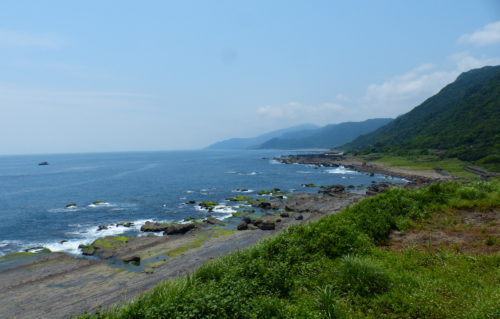It seems quite natural that someone who has been head of the DPP twice is now competing for its Presidential nomination. However, the closer one looks at the case of Hsu Hsin-liang (許信良), the more unsusual it appears to be.
For example, a Chinese dissident has mentioned Hsu’s name in connection with alleged plans for a Beijing-funded political organization, to be established as a puppet party in Taiwan after the 2012 Presidential elections (see below).
He has also been called a „DPP turncoat“ whose „position in the election primary is exactly the same as the KMT’s.“
Hsu admitted he has a slim chance of winning the primaries, but said he wants to „make society care about the issues I hold close to my heart. (…) This is my motive; I have no other motives.”
Some of his political views are far removed from DPP mainstream.
Asked about his views on cross-strait relations, including Chinese pressure on Taiwan’s international space, Hsu said: “I only care about social welfare and everything else comes second.”
This video is an excerpt from the first TV debate between the three DPP candidates for the Presidential ticket, broadcast on April 9, 2011. There were two more on April 13 and 16, and a last one will follow on April 20. The DPP wants to settle on a candidate by May 4.
Although it looks like the race will be between political heavyweights Tsai Ing-wen and Su Tseng-chang, Hsu manages to steal the limelight and make a lot of headlines.
The most emotional performance came from Hsu Hsin-liang (許信良) when he said that Taiwan should “open up wide to Chinese money, students and tourists” — true to his election announcement that he did not expect to win, but hoped to influence election policy.
“The single most important issue is Taiwan’s economic growth,” Hsu said.
“I care about cross-strait ties because I care about their economic impact. Only with growth can we craft and fund better social welfare policies,” Hsu said.
AP
A veteran politician said Saturday that Taiwan’s main opposition party should drop its anti-China stance and sanction unrestricted Chinese investment in the self-governing island in order to win next year’s presidential election.
(Equating the DPP with „anti-China“ is a mistake often made by some western media organizations reporting from Taiwan.)
In an editorial, the Taipei Times called Hsu’s candidacy a sign of the DPP’s „democratic maturity“.
During the last almost 40 years, Hsu Hsin-liang has switched his political affiliation so often that he has been called „the master (chameleon), bar none“ of Taiwanese politics:
A man who has always wanted to lead the parade, but has rarely had a sustainable following. He is a man who loves to talk and press the flesh, but has not had a recognizable job in decades. Yet, surprisingly, he seems to live well enough — so much so that he makes many wonder where his money comes from.
Hsu started out with the Kuomintang (KMT) in the early 70’s and won the Taoyuan County Commissioner Elections in 1977 as a independent. He was DPP Chairman from 1992-93 and 1996-98, twice failing to secure his party’s Presidential ticket. He split with the DPP and ran as an independent candidate in Taiwan’s 2000 elections. Hsu supported the KMT in 2004 and the DPP again in 2008. In March 2011, to everyone’s surprise, he announced his participation in the current DPP primary.
That did not come cheap.
When registering his candidacy, Hsu had to pay a USD 170,000 fee that, according to the Taipei Times, he borrowed from his brother’s business connections. (Two-thirds of the sum will apparently be returned once a candidate drops out of the race.)
And now for something completely different.
In 2009, the Chinese dissident Yuan Hongbing (袁红冰) published his book „Taiwan Disaster“ (台灣大劫難). The English translation, titled „The Taiwan Crisis: China’s Plan to Annex Taiwan without a Battle by 2012“, came out in 2010. In Taiwan, it is available here, here and in the Taoyuan Airport bookshop.
Yuan, a former law professor at Peking University and self-proclaimed drinking companion of China’s Vice President Xi Jinping during the 1980’s, currently lives in exile in Australia. He claims to have been provided with highly classified internal CCP documents revealing China’s strategies to annex Taiwan.
One of those strategies, he claims, is to establish a Chinese-run „Taiwan Socialist Democratic Party“ within Taiwan.
But how to give a puppet party a credible facade?Even if Taiwan became „one country, two systems“ and continued under a „democratic system“, pro-independence ideas could not be allowed to „roam free“ or else China would face endless troubles. Even if China politically allies top KMT members through United Front operations, there is a substantial portion of base members and Taiwanization groups who are deeply anti-Communist. Moreover, the KMT’s ability to take control of society during a drastic time of change is questionable. Given the KMT’s political position and ability, it would be unwise to completely trust the KMT and put all of China’s political eggs in one basket. China must set up a powerful organization in Taiwan that fully complies to Beijing’s political will in order to ensure that China’s political plans are successfully realized during and after reunification. Only then can China be assured that Taiwan will not continue to be a troublemaker after reunification. (pp. 135 f.)
Yes, that sounds like on huge conspiracy theory. Let’s all hope it is.Wang Huning acted as chief counsultant to the preparation team. He demanded that the team pay particular attention in pulling out a few iconic characters from both the KMT and the DPP to enter the SDP and to hand them important jobs. Wang believed that if representatives from both the KMT and the DPP became iconic figures of the SDP, then sharp polarization would be sparked in both camps. (…) By Wang Huning’s suggestion, the preparation team listed Song Chuyu, Hsu Hsinliang (sic) and twenty other marginalized figures from the KMT and DPP as important targets for becoming Central Committee members of the SDP. (…) After continuous discussion, it is confirmed in the „Political Strategies to Solve the Taiwan Problem“ that the SDP will be publically registered after the spring elections in 2012, just before the presidential inauguration. The first mission of the SDP will be determined by the outcome of the election. If the DPP wins, the SDP will announce a „Taiwan Independence“ threat before the new president is in office, unite with the KMT, and call on China to send in troops to control the situation. If the KMT wins, then the SDP will take all effective measures to push the KMT into signing a reunification agreement revoking Taiwan as Republic of China, abolishing the ROC constitution, and implementing the constitution of Communist China before the 18th Congress in 2012. (pp. 141 f.)
Meanwhile, Hsu Hin-liang has won the support of other marginalized former DPP figures, notably former Kaohsiung County Commissioner Yang Chiu-hsing (楊秋興), who ran against the DPP as an independent candidate last November after not securing his party’s nomination for the post of Greater Kaohsiung Mayor. And of former independence movement icon and DPP Chairman Shih Ming-teh (施明德), by now a highly polarizing figure detested by many of his former supporters.
There is suspicion that Hsu will run for President as an independent candidate once the DPP turns him down again – although when he tried that in 2000, having just stepped down from the DPP Chairmanship, he did not even collect 1% of the vote.Shih and Hsu denied that they were aligned with the Chinese Nationalist Party (KMT).
Back in 2006, Jerome Keating wrote about Hsu in „Taiwan: The Struggles of a Democracy“:
Only one thing is for sure: This will be a very exciting year for everyone interested in Taiwanese politics.His hatred for the DPP, which twice passed him over, influences his speech. Yet the man cannot bear to bow out of the limelight. There is only one place left he has not tried, the PRC. There he will have to give up many illusions of being the great leader. His monk image won’t sell; and one wonders what he would then say about democracy. Stranger things have happened. (p. 105)
I am a German reporter living and working in Taiwan. Click here for more English posts on this otherwise mostly German blog. You can also follow me on Twitter and Facebook.
Das könnte auch interessant sein:
- Brawl or no brawl? Taiwan's opposition leader on the reasons for fights in parliament
- 10 English online sources of information about Taiwan’s upcoming elections
- How some people experienced the rallies on Taiwan’s Super Sunday. And tweeted about it.
- Mein Ausflug ins Wahllokal
Powered by YARPP.





Eine Antwort
Great post!